-
 Bitcoin
Bitcoin $82,099.5826
-1.34% -
 Ethereum
Ethereum $1,817.9545
-1.07% -
 Tether USDt
Tether USDt $0.9999
0.02% -
 XRP
XRP $2.0815
-3.96% -
 BNB
BNB $595.8647
-1.53% -
 Solana
Solana $124.0327
-0.92% -
 USDC
USDC $1.0000
0.01% -
 Dogecoin
Dogecoin $0.1634
-3.94% -
 Cardano
Cardano $0.6445
-4.65% -
 TRON
TRON $0.2336
1.34% -
 Toncoin
Toncoin $3.9381
2.61% -
 Chainlink
Chainlink $13.2201
-3.75% -
 UNUS SED LEO
UNUS SED LEO $9.0947
-5.84% -
 Stellar
Stellar $0.2646
-1.90% -
 Avalanche
Avalanche $18.6234
-3.91% -
 Shiba Inu
Shiba Inu $0.0...01214
-3.88% -
 Sui
Sui $2.2126
-6.78% -
 Hedera
Hedera $0.1604
-6.61% -
 Polkadot
Polkadot $4.0237
-1.97% -
 Litecoin
Litecoin $82.1655
-4.48% -
 MANTRA
MANTRA $6.2849
-1.13% -
 Bitcoin Cash
Bitcoin Cash $298.8203
-2.66% -
 Dai
Dai $1.0000
0.02% -
 Bitget Token
Bitget Token $4.4293
-4.57% -
 Ethena USDe
Ethena USDe $1.0000
0.01% -
 Pi
Pi $0.6976
-9.77% -
 Hyperliquid
Hyperliquid $12.5853
-0.74% -
 Monero
Monero $215.4717
-0.22% -
 Uniswap
Uniswap $5.8825
-1.85% -
 Aptos
Aptos $5.1958
-2.29%
How do I view real-time gas fee estimates in Trust Wallet?
Trust Wallet doesn't show real-time gas fees, but users can check them on block explorers like Etherscan or use gas fee estimators before confirming transactions.
Mar 27, 2025 at 12:42 pm
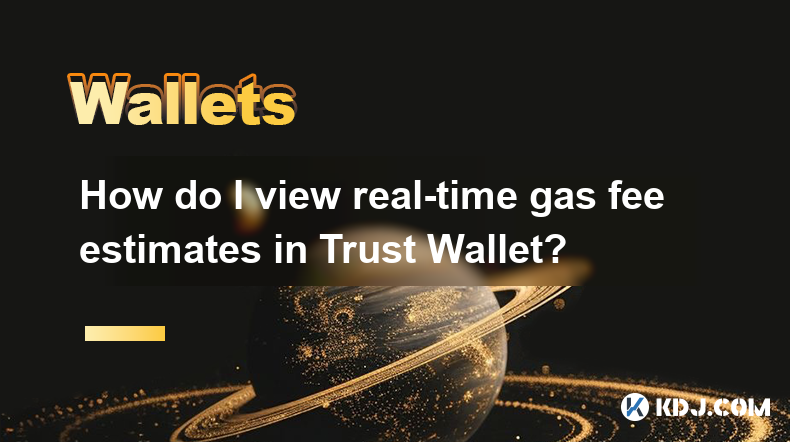
Trust Wallet, a popular mobile cryptocurrency wallet, doesn't directly display real-time gas fee estimates within its interface in the same way some dedicated DeFi apps do. This is because gas fees are determined on the Ethereum network (and other EVM-compatible chains) and are constantly fluctuating. Trust Wallet focuses on providing a secure and user-friendly interface for managing your crypto assets, rather than incorporating complex, real-time network data analysis. However, there are several ways to get the information you need before confirming a transaction.
Obtaining Real-Time Gas Fee Estimates
To get a real-time gas fee estimate, you need to utilize external resources that interact directly with the Ethereum network. These tools provide up-to-the-minute information about the network congestion and the resulting gas prices. Here's how you can obtain this crucial information:
Use a Block Explorer: Websites like Etherscan or BscScan (for Binance Smart Chain) allow you to check the current gas prices. These explorers provide detailed information about the network's activity and the average gas fees being paid for transactions. Simply navigate to the relevant explorer for the network you're using and look for the gas price information, often displayed prominently on the homepage. Remember to always double-check the network you are using before looking up gas fees.
Employ a Gas Fee Estimator Tool: Many websites and applications offer dedicated gas fee estimator tools. These tools often present the gas price in Gwei (a unit of Ether), allowing you to input the transaction details and receive an estimated fee. Be cautious and verify the legitimacy of the tool before using it. Many such tools are available online; a simple search will provide numerous options.
Consult a Decentralized Exchange (DEX): If you are interacting with a DEX like Uniswap or PancakeSwap, these platforms usually provide gas fee estimates directly within their interface before you confirm a transaction. Always verify the displayed gas fee before confirming the transaction, as it can fluctuate even within the short time between viewing and confirmation. The estimate provided by the DEX is usually based on current network conditions.
Check Your DApp's Interface: Some decentralized applications (dApps) built on Ethereum or compatible networks incorporate gas fee estimations directly into their user interfaces. This provides a convenient way to view the estimated cost before initiating a transaction. Always verify the gas fee estimate displayed on the DApp's interface before confirming the transaction. Each DApp may present this information differently.
The process of using these methods involves several steps. Let's illustrate using a block explorer as an example:
- Step 1: Identify the Network: Determine which blockchain network your transaction will use (Ethereum, Binance Smart Chain, Polygon, etc.).
- Step 2: Choose the Block Explorer: Select the appropriate block explorer for your chosen network (e.g., Etherscan for Ethereum).
- Step 3: Locate Gas Price Information: Navigate to the block explorer's homepage or a dedicated gas price section.
- Step 4: Note the Gas Price: Observe the current gas price, usually expressed in Gwei.
- Step 5: Use the Information: Use this gas price as a reference when initiating your transaction in Trust Wallet. Remember that the gas price can change rapidly.
Understanding the volatility of gas fees is critical. The price fluctuates based on network congestion. High network activity leads to higher gas fees, while low activity leads to lower fees. This means the estimate you obtain is only valid for a short period. It's advisable to check the gas price immediately before confirming your transaction in Trust Wallet. Always factor in a buffer to account for potential price fluctuations.
Understanding Gas Fees in the Context of Trust Wallet
It's important to understand that Trust Wallet itself doesn't calculate or display real-time gas fees. It acts as a gateway to the blockchain, relaying your transaction request to the network. The network then determines the actual gas fee based on its current conditions. Trust Wallet simply passes the fee information to the network. Therefore, obtaining the estimate from an external source is necessary for informed decision-making. Always be mindful of the gas fee before confirming any transaction. High gas fees can significantly impact the cost of your transaction.
Trust Wallet's role is primarily to secure your private keys and facilitate the interaction with the blockchain. The responsibility of obtaining accurate and up-to-date gas fee information rests with the user. By utilizing the methods described above, users can obtain the necessary information to make informed choices about their transactions. Never underestimate the importance of verifying gas fees before sending transactions. Unexpectedly high fees can be costly.
Frequently Asked Questions
Q: Why doesn't Trust Wallet show real-time gas fees directly?
A: Trust Wallet prioritizes security and ease of use for managing crypto assets. Integrating real-time gas fee calculation adds complexity and could potentially introduce vulnerabilities. It's more efficient to rely on dedicated network tools for this specific information.
Q: Can I adjust the gas fee in Trust Wallet?
A: Trust Wallet usually allows you to adjust the gas limit (the maximum amount of gas your transaction can consume), but it typically doesn't allow direct manipulation of the gas price (Gwei). You obtain the gas price from an external source, and Trust Wallet uses that price.
Q: What happens if I set the gas fee too low?
A: If the gas fee is too low, your transaction might fail to be processed by the network because miners will prioritize transactions with higher fees. Your transaction will remain pending indefinitely, or it will be rejected.
Q: What happens if I set the gas fee too high?
A: Setting the gas fee too high simply means you'll pay more than necessary for your transaction. While not ideal, it ensures your transaction will likely be processed quickly.
Q: Where can I find the most reliable gas fee information?
A: Reputable block explorers like Etherscan and BscScan are generally considered reliable sources for current gas prices. However, always compare data from multiple sources for confirmation.
Q: Are there any risks associated with using external gas fee estimators?
A: Yes, always ensure you're using a trustworthy and well-known gas fee estimator. Malicious websites or applications could potentially steal your information. Stick to reputable sources.
Disclaimer:info@kdj.com
The information provided is not trading advice. kdj.com does not assume any responsibility for any investments made based on the information provided in this article. Cryptocurrencies are highly volatile and it is highly recommended that you invest with caution after thorough research!
If you believe that the content used on this website infringes your copyright, please contact us immediately (info@kdj.com) and we will delete it promptly.
- The Crypto World Has Many Choices for Investors Who Want Safe Gains
- 2025-03-31 21:20:13
- Dogecoin (DOGE) Has a Turbulent Start to March, But Technical Indicators Hint at a Potential Bullish Turnaround
- 2025-03-31 21:20:13
- Dogecoin (DOGE) and Shiba Inu (SHIB) Whales Are Dumping to Buy Coldware (COLD)
- 2025-03-31 21:15:12
- Australia's financial crime regulator warns cryptocurrency ATM providers that many of these machines may be facilitating money laundering or defrauding victims
- 2025-03-31 21:15:12
- As Sui (SUI) Prepares to Unlock $151M, Coldware (COLD) Quietly Captures the Next Billion Users
- 2025-03-31 21:10:12
- Cryptocurrency investors are increasingly moving capital into stablecoins and tokenized real-world assets (RWAs)
- 2025-03-31 21:10:12
Related knowledge

How to easily generate a Bitcoin payment address
Mar 29,2025 at 10:49am
Generating a Bitcoin payment address might seem daunting, but it's actually quite straightforward. This process is crucial for receiving Bitcoin, as each transaction requires a unique address. Understanding how this works is fundamental to using Bitcoin effectively. This guide will walk you through the simple steps, regardless of your technical experti...
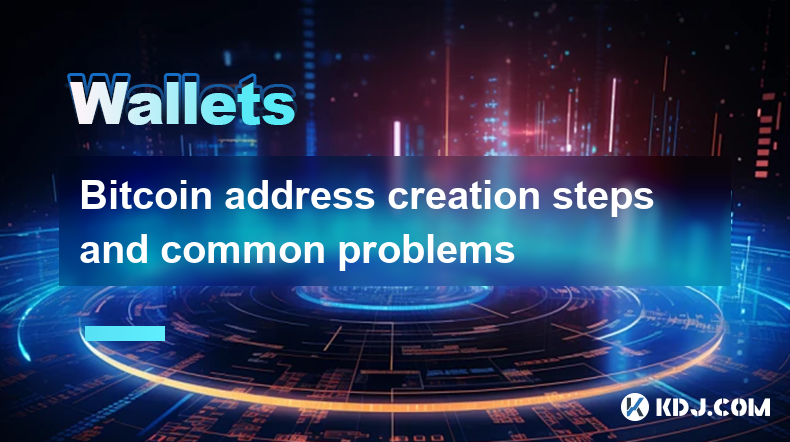
Bitcoin address creation steps and common problems
Mar 30,2025 at 06:07am
Understanding Bitcoin AddressesA Bitcoin address is a unique identifier, similar to a bank account number, used to receive Bitcoin. It's a string of alphanumeric characters generated from a public key, derived from your private key. Understanding the distinction between public and private keys is crucial for Bitcoin security. Your private key should be...
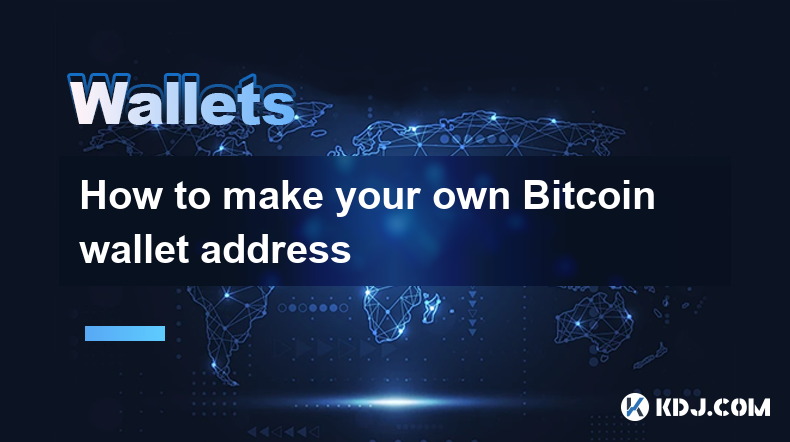
How to make your own Bitcoin wallet address
Mar 29,2025 at 08:42pm
Creating your own Bitcoin wallet address is crucial for securing and managing your Bitcoin holdings. It allows you to independently receive and send Bitcoin without relying on third-party services. This process involves understanding the different types of wallets and choosing the one that best suits your needs and technical expertise. Incorrectly gene...
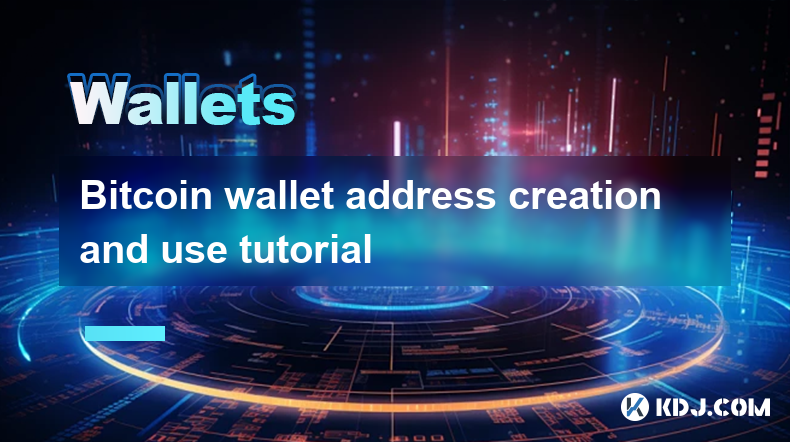
Bitcoin wallet address creation and use tutorial
Mar 29,2025 at 10:14pm
Understanding Bitcoin Wallet AddressesA Bitcoin wallet doesn't store Bitcoin in the way a traditional bank account does. Instead, it stores private keys, which are cryptographic secrets allowing you to access and spend your Bitcoin. Your Bitcoin address, on the other hand, is a public identifier, like an email address, that others can use to send you B...

Bitcoin address generation and secure storage guide
Mar 30,2025 at 08:07am
Understanding Bitcoin AddressesA Bitcoin address is essentially your public key, a string of alphanumeric characters used to receive Bitcoin. It's analogous to your bank account number. Unlike your private key, which is crucial for spending your Bitcoin, your address can be shared publicly without compromising your funds. Generating a new address is sim...
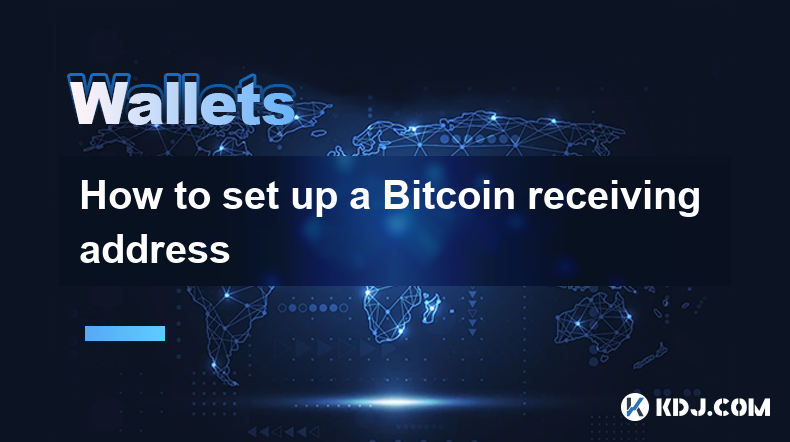
How to set up a Bitcoin receiving address
Mar 30,2025 at 06:14pm
Understanding Bitcoin Receiving AddressesA Bitcoin receiving address is essentially your unique identifier on the Bitcoin network. It's a string of alphanumeric characters that allows others to send Bitcoin to you. Think of it like your bank account number, but specifically for Bitcoin. You need a receiving address to receive Bitcoin. Crucially, you ca...

How to easily generate a Bitcoin payment address
Mar 29,2025 at 10:49am
Generating a Bitcoin payment address might seem daunting, but it's actually quite straightforward. This process is crucial for receiving Bitcoin, as each transaction requires a unique address. Understanding how this works is fundamental to using Bitcoin effectively. This guide will walk you through the simple steps, regardless of your technical experti...

Bitcoin address creation steps and common problems
Mar 30,2025 at 06:07am
Understanding Bitcoin AddressesA Bitcoin address is a unique identifier, similar to a bank account number, used to receive Bitcoin. It's a string of alphanumeric characters generated from a public key, derived from your private key. Understanding the distinction between public and private keys is crucial for Bitcoin security. Your private key should be...

How to make your own Bitcoin wallet address
Mar 29,2025 at 08:42pm
Creating your own Bitcoin wallet address is crucial for securing and managing your Bitcoin holdings. It allows you to independently receive and send Bitcoin without relying on third-party services. This process involves understanding the different types of wallets and choosing the one that best suits your needs and technical expertise. Incorrectly gene...

Bitcoin wallet address creation and use tutorial
Mar 29,2025 at 10:14pm
Understanding Bitcoin Wallet AddressesA Bitcoin wallet doesn't store Bitcoin in the way a traditional bank account does. Instead, it stores private keys, which are cryptographic secrets allowing you to access and spend your Bitcoin. Your Bitcoin address, on the other hand, is a public identifier, like an email address, that others can use to send you B...

Bitcoin address generation and secure storage guide
Mar 30,2025 at 08:07am
Understanding Bitcoin AddressesA Bitcoin address is essentially your public key, a string of alphanumeric characters used to receive Bitcoin. It's analogous to your bank account number. Unlike your private key, which is crucial for spending your Bitcoin, your address can be shared publicly without compromising your funds. Generating a new address is sim...

How to set up a Bitcoin receiving address
Mar 30,2025 at 06:14pm
Understanding Bitcoin Receiving AddressesA Bitcoin receiving address is essentially your unique identifier on the Bitcoin network. It's a string of alphanumeric characters that allows others to send Bitcoin to you. Think of it like your bank account number, but specifically for Bitcoin. You need a receiving address to receive Bitcoin. Crucially, you ca...
See all articles






















































































